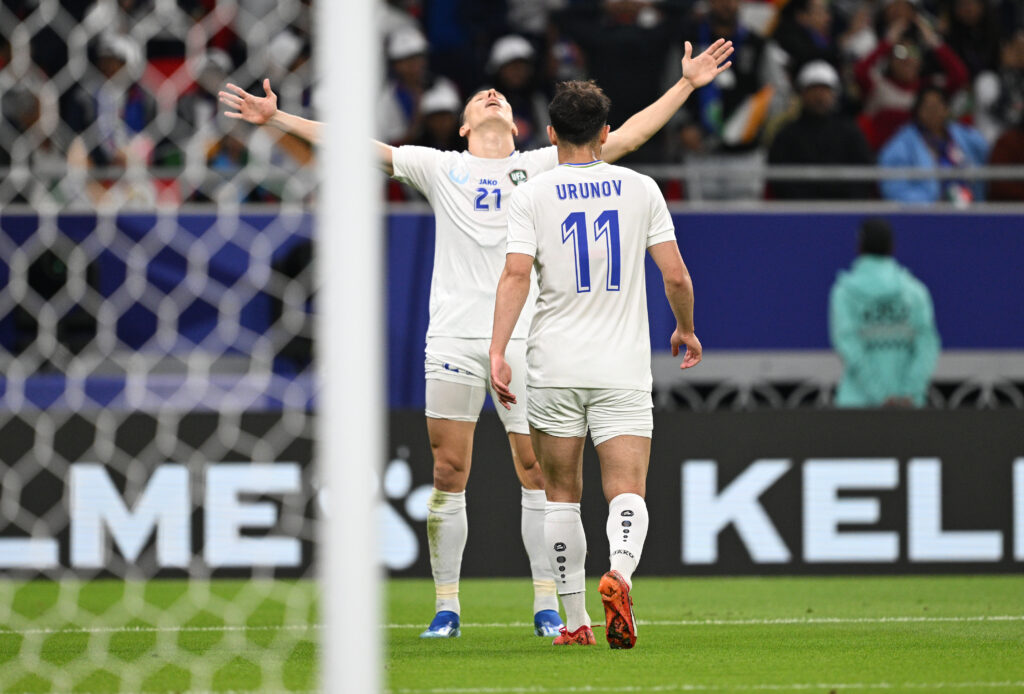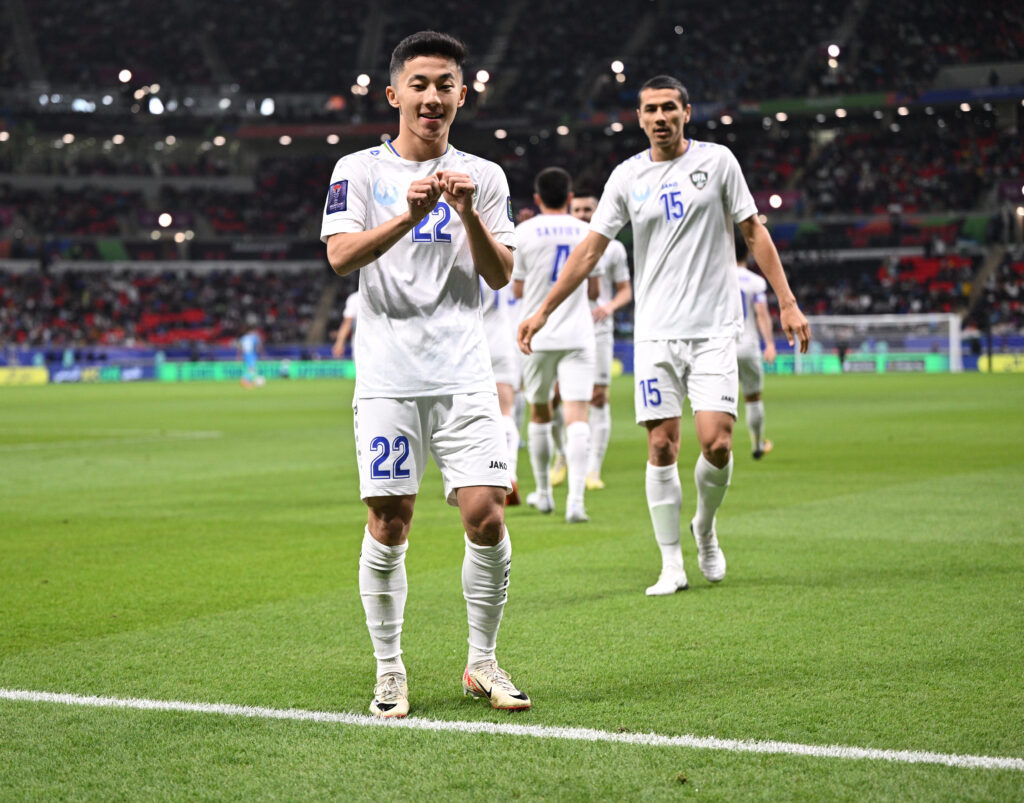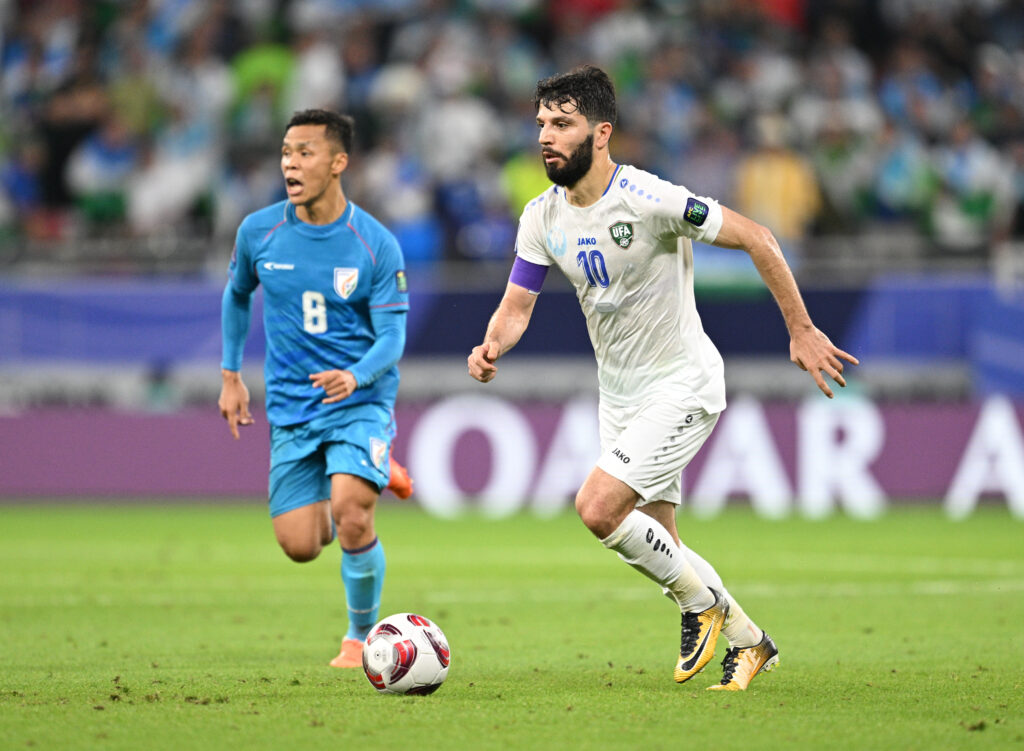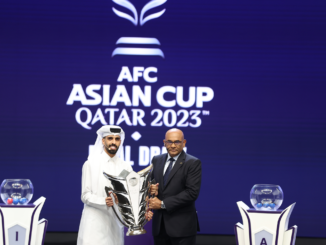
Uzbekistan’s comfortable 3-0 victory over India on Thursday may not been too surprising for most in Al Rayyan’s Ahmad bin Ali Stadium, but it came as an emphatic welcome to the tournament for the White Wolves who had previously opened their account with a stutter.
Thursday’s victory came off the back of a meagre 0-0 draw against Syria in their opening game of the tournament. With expectations rising ahead of the tournament, an uncharacteristically flawed performance in Doha wasn’t the start most had imagined – and the squad knew it.
A week on, with the usually level-headed Srečko Katenec left prickly swatting away criticism in the pre-match press conference, a return to the type of form we all know this side can offer against India was the tonic the whole camp needed.
It wasn’t simply a reset and go-again approach from their Slovenian coach, either. Somewhat surprisingly, bowing to media pressure, Katenec reverted to a more attack focused 4-2-3-1 formation, crucially moving away from a back three setup that had been the bedrock of their success since he was appointed three years ago.
While criticism of the approach seemed overblown, especially given the team’s record (18 wins in 29 under Katanec), there were credible reasons to take this moment to rethink.
One being injury, the dreaded word in the Uzbek camp this last month, having succumbed to the long running ‘will he, won’t he?’ drama that greeted talisman Eldor Shomurodov’s desperate attempts to return to fitness on the eve of the tournament.

He was eventually accompanied on the injury list by integral defender Husniddin Alikulov a few days before kick off, and right wing back Khozhiakbar Alijonov a few days after Syria.
With three first teamers down in a couple of weeks, change quickly become a necessity.
Few in Asia could cope with such an injury pile up at the start of an international tournament, so trepidation was always going to be experienced.
Add to the mix, an out of sorts Jaloliddin Masharipov. Stepping into the shoes of Shomurodov as the squad’s leader, proposed talisman and chief goal scorer, a mantle that has, until now, proved elusive.
While Shomurodov, described as “our Messi” by his coach this last week, often relished in the one-man show, Masharipov’s best performances, either at club level or in national team colours, have often been part of a wider team display, where he has benefited from those around him, more than any individual inspiration.
Into the breach then comes Abbosbek Fayzullaev.
Once feared to be too slight, or too peripheral to really make the most of his undoubted ability, his development has gone from strength-to-strength over the last 12 months, blossoming into an all action, effective and central creator, playmaker and goalscorer at every Uzbek youth level, and now in European club football with CSKA Moscow.

While Katenec probably foresaw the 20-year-old’s presence in Qatar as more of an impact player initially, his brief cameo against Syria underlined the necessity of not only promoting him with an immediate start against India, but by building the team around him.
Manoeuvring from his tried and trusted 3-4-3, to a 4-2-3-1, Katenec replaced a central defender with a number ten – injecting the squad with the creative lynchpin it craved, with freedom to roam and devastate.
Within a minute, Fayzullaev had made his presence felt. Within four, he’d opened Uzbekistan’s account in Qatar with a perfectly judged looping header – not bad for a player that only stands at just over 5’7’’.
A simple change in emphasis, albeit aided by an Indian team that positively took the game to their opponents, leaving gaps in behind that Syria, or more to the point, their coach Hector Cuper hadn’t allowed, instantly rubbed off on those around their creator-in-chief.
Masharipov’s outlook clarified; providing the types of interchange we’ve been used to in years of old. Oston Uronov, pushed back out wide, started threatening once more with pace, the recalled Igor Sergeev played effectively off the shoulder of the last man, while even the wing backs, so integral to Katenec’s previous approach, continued to be given licence to roam, combining directly for Uzbekistan’s third goal of the night.
As the pieces all fell into place, optimism had returned to a campaign many had secretly had high hopes for, but dared not speak out loud.
For that to materialise, Australia, the ruthlessly effective, if not yet awake Asian giant, stand in their way on top spot in Group B, even if progression is all but guaranteed.
They offer another marker to challenge themselves in making the next step towards their ultimate goal – World Cup qualification in two years’ time.
By then, the likes of Fayzullaev will be out of adolescence, all being well established in a top five league in Europe, alongside the aforementioned Alikulov, who’s settled well in Turkey, his injury replacement Abdukodir Khusanov, who moved to Lens in the summer and Uronov, who is tipped to join Fayzullaev in the Russian capital this winter. And, of course, add in the return of a fit and firing Shomurodov to the fold.
The Asian Cup was always seen as an added extra, a first foray into a four-year period where promise is turned into reality – but with that, expectations need to be managed.

Yesterday’s victory, however comfortable, came with its own warning signs. India continually threatened on the counter, and there were sizeable passages of play where Uzbekistan took their foot off the pedal.
With stiffer challenges to come, starting with Australia on Tuesday, a return to Katenec’s pragmatism which had got them to this point, shouldn’t be sneered at if it does make a return.
The difference, one week on from the wake-up call against Syria, is a realisation that this team has flexibility, this team has depth, and this team doesn’t stop at Shomurodov.
This team now has another wonder kid to inspire future success – just how much more can be achieved in Qatar, we will have to wait and see.
Photos: Asian Football Confederation
Listen to The Asian Game Podcast as we look back on the opening week of action at the AFC Asian Cup 2023




